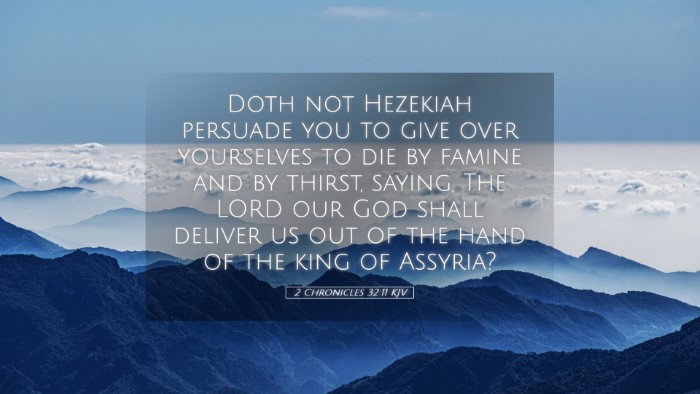Commentary on 2 Chronicles 32:11
2 Chronicles 32:11 states: "Doth not Hezekiah persuade you to give over yourselves to die by hunger and by thirst, saying, The Lord our God shall deliver us out of the hand of the king of Assyria?" This verse captures a moment of spiritual and political challenge during the reign of King Hezekiah, as he faced the formidable threat posed by the Assyrian empire under King Sennacherib.
Contextual Background
To fully appreciate this passage, it is essential to understand the historical context. Hezekiah ascended to the throne of Judah and initiated significant religious reforms, eliminating idolatry and restoring temple worship. His reign was marked by faithfulness to Yahweh, which culminated in a firm stand against the Assyrian invasion.
The Assyrian king, Sennacherib, had already conquered various nations and sought to instill fear in Judah, aiming to eradicate their faith. In this context, Hezekiah's challenge was twofold: to maintain trust in God amid dire circumstances and to navigate the political relations with powerful adversaries.
Commentary Insights
Matthew Henry's Commentary
Matthew Henry addresses the emotional and spiritual implications of this scripture, highlighting that the Assyrian officials sought to demoralize the people of Judah. They aimed to undermine Hezekiah's encouragement, positing that yielding to the Assyrians was better than facing starvation brought on by resistance. Henry notes that the rhetoric employed by the Assyrian representatives was not merely a military strategy but an assault on the people's faith.
He emphasizes that Hezekiah’s trust in God was key to resisting such temptation. By failing to surrender to adversarial threats, Hezekiah demonstrated a profound example of faith grounded in the historical actions of God, as well as an urging towards the people not to succumb to despair.
Albert Barnes' Notes
Albert Barnes provides a detailed analysis of the verse, focusing on the psychological warfare being waged by Sennacherib. He clarifies that the Assyrian representatives attempted to persuade the people of Judah by questioning the efficacy of Hezekiah's faith in God. This linguistic strategy aimed to create fear and hesitation among the citizens.
Barnes emphasizes the significance of the assertion that God would indeed deliver them. He argues that despite the apparent might of the Assyrian army, God’s faithfulness should not be underestimated. Instead of succumbing to despair, the people were called to remember the covenant and previous deliverances. This invites a lesson in standing firm in faith despite external pressures.
Adam Clarke's Commentary
Adam Clarke offers insights into the socio-religious dynamics at play during this episode. He points out that the questioning of Hezekiah's faith by the Assyrians was designed to disrupt the unity and confidence of the nation. Clarke describes how Hezekiah was a leader who sought to bring the people back to a singular focus on God’s power and provision.
Clarke also addresses the phrase concerning hunger and thirst - a direct reference to the siege anticipated by the Assyrian advance. He explains that the message from the Assyrians was one of strategic intimidation, embodying a visceral sense of immediacy that was prevalent in ancient warfare.
Theological Implications
This verse invites considerable reflection on several theological themes that resonate throughout scripture:
- Faith in Adversity: Hezekiah exemplifies steadfast faith amid overwhelming challenges, a characteristic that is consistently encouraged throughout scripture.
- The Sovereignty of God: The insistence on God’s deliverance underscores the belief in divine sovereignty, reinforcing the idea that human power holds no candle to God’s authority.
- The Power of Persuasion: The Assyrian's attempt to sow doubt reveals how external voices can influence internal beliefs and behaviors within a community.
- Leadership and Hope: Hezekiah’s role as a leader is pivotal—he not only faces threats but also guides his people towards hope and reliance on God.
Practical Applications
For pastors, students, and theologians, the implications of 2 Chronicles 32:11 translate into contemporary spiritual leadership and communal faith practices. The following points may serve as a guide:
- Encouragement in Leadership: Leaders should strive to build hope within their communities, especially in times of uncertainty.
- Teaching Resilience: It is pivotal to teach congregations about the history of God’s deliverance to combat doubts and fears prevalent in challenging times.
- Addressing Doubt: Churches should be equipped to address external doubts and fears; empowering believers with biblical truths to counteract such influences.
- Reminding of God’s Faithfulness: Regular reminders of God’s past deliverances in both scripture and personal testimonies can fortify the faith of the community.
Conclusion
In conclusion, 2 Chronicles 32:11 is a poignant reminder of the challenges of faith amidst external threats and doubt. The collective insights from Matthew Henry, Albert Barnes, and Adam Clarke provide a rich tapestry of understanding that informs our knowledge of historical context, psychological warfare, and the enduring power of faith in God. This exploration serves as encouragement for contemporary believers to hold firm to their faith and trust in God’s provision during trials.


